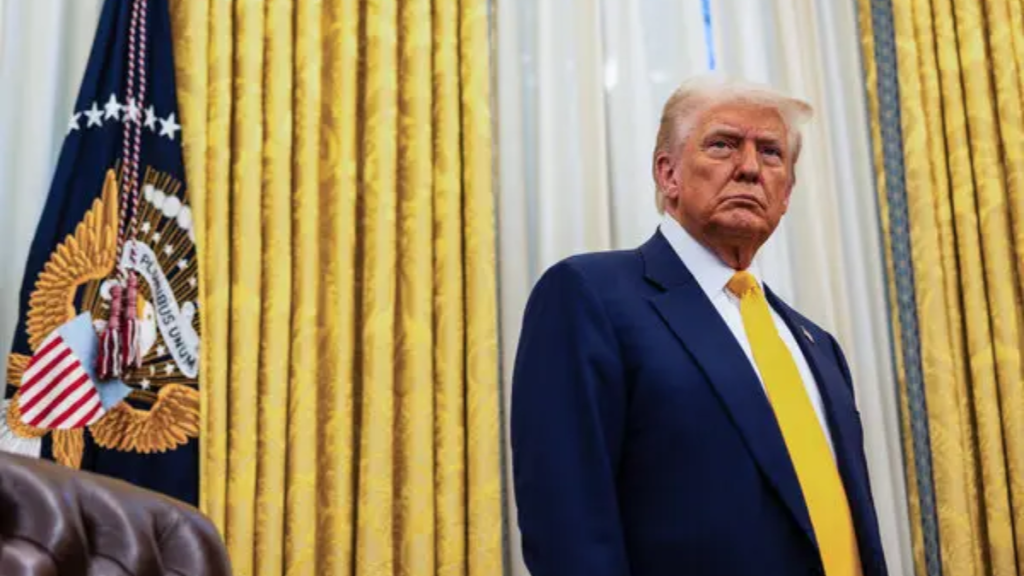Several Democratic-led states have filed a lawsuit against former President Donald Trump’s administration, challenging a series of actions aimed at reshaping the U.S. electoral system. The states argue that the proposed changes would undermine voting rights and interfere with fair election processes.
The lawsuit, filed in early 2025, seeks to block key aspects of Trump’s ongoing efforts to influence the electoral system post-presidency.
At the heart of the lawsuit is the Trump administration’s move to introduce new voting rules, including changes to mail-in ballots, voter ID laws, and the authority given to state legislatures in overseeing elections.
The legal challenge claims that these efforts violate the constitutional rights of voters, particularly in states where significant populations of minority and marginalized communities reside.
The Key Proposals Under Fire
The states involved in the lawsuit argue that Trump’s post-presidency actions reflect an overreach that would fundamentally alter the U.S. electoral landscape. The proposals targeted by the lawsuit include:
1. Tightening Voter ID Requirements
One of the primary changes at the center of the legal battle is a proposal to introduce stricter voter ID requirements. The new rules would require voters to present government-issued identification at the polls or when submitting absentee ballots.
The lawsuit claims that such measures would disproportionately affect low-income individuals and minority communities who may have difficulty obtaining the required documentation.
2. Restrictions on Mail-In Voting
Another contentious proposal would place limitations on the use of mail-in voting, including reducing the time frame in which absentee ballots can be submitted.
The lawsuit argues that these restrictions are designed to disenfranchise voters who rely on mail-in ballots due to work schedules, health concerns, or geographic barriers to in-person voting.
3. Increased State Control Over Elections
Trump’s proposal also seeks to grant state legislatures more authority in overseeing and certifying elections. This includes granting governors and state legislatures greater discretion in determining election results in states where elections are close or contested.
Critics of the plan argue that this could lead to partisan manipulation of election outcomes, undermining the principle of free and fair elections.
The Democratic States’ Legal Claims
The legal challenge has been filed by several Democratic-controlled states, including California, New York, and Illinois. These states argue that the proposed changes violate the Voting Rights Act of 1965, which protects against discriminatory practices that suppress minority votes.
The lawsuit also claims that Trump’s actions violate the Equal Protection Clause of the 14th Amendment, which guarantees that all citizens receive equal treatment under the law.
The states argue that the changes would disproportionately impact Black, Latino, and Indigenous voters, who tend to favor Democratic candidates. They claim that Trump’s proposals would effectively roll back protections that have been in place to ensure that all citizens, regardless of background, have access to the ballot box.

Legal Implications and Potential Outcomes
The outcome of the lawsuit could have significant implications for how future elections are conducted in the United States. If the courts rule in favor of the Democratic states, it could prevent the implementation of many of Trump’s proposed changes.
On the other hand, if the court sides with the former president, it could set a precedent for greater state control over elections and the implementation of stricter voter identification laws.
The case is expected to draw widespread attention, as it could impact not only presidential elections but also midterm elections, gubernatorial races, and other local elections.
Legal experts warn that if the proposed changes are upheld, it could lead to further polarization and partisan conflicts over election procedures in the coming years.
Why This Legal Battle Matters
The battle over voting rights and electoral integrity is particularly significant in light of the contentious elections of the past few years. Following the 2020 Presidential Election, Trump repeatedly claimed that the election was stolen, a claim that has been widely discredited.
However, his administration’s push for changes to the electoral system reflects a broader effort to reshape how Americans vote, particularly in battleground states where elections are often decided by a narrow margin.
The Democratic states argue that these changes are part of a broader Republican effort to suppress votes from communities that tend to vote Democratic.
They also contend that the changes could create a patchwork system where voters in different states face different requirements, making it harder for Americans to vote in federal elections.
The Path Forward for the Lawsuit
As the lawsuit progresses, legal analysts will closely watch the court’s handling of the case, particularly its interpretation of the Voting Rights Act and the Equal Protection Clause. The case could take months or even years to reach a resolution, and it may eventually reach the Supreme Court for a final ruling.
In the meantime, Democratic lawmakers and activists will continue to advocate for measures that protect the integrity of the voting process and ensure that all Americans have equal access to the ballot box.
Conclusion: A Critical Legal Challenge to U.S. Election Integrity
The legal battle between Democratic states and former President Donald Trump’s administration marks a critical moment in the ongoing debate over voting rights and election reform in the United States.
The outcome of this lawsuit could shape the future of U.S. elections, determining whether voting processes are streamlined and protected or subjected to stricter regulations that could disenfranchise millions of voters.
For more information on the developments of this lawsuit and its potential impact on upcoming elections, visit The New York Times.
Disclaimer – Our team has carefully fact-checked this article to make sure it’s accurate and free from any misinformation. We’re dedicated to keeping our content honest and reliable for our readers.
